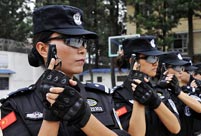A total of 9,977 doping tests have been conducted on Chinese athletes this year, of which 20 returned positive results, according to the country's top sports official.
Speaking at a meeting held on the eve of the opening of the 12th Chinese National Games, sports minister Liu Peng said that 20 positive cases have already been reported by Aug. 26 this year, a considerable rise from the 14 drug cheats caught in 2012. Of the 20 positive cases, one was detected through the biological passport program.
"The year of the National Games tends to witness more drug cheats, which thus puts us on high alert ahead of the 12th National Games," said Liu.
The National Games, the country's own mini-Olympics, will officially open on Saturday and doping remains one of the biggest challenges as winning a title at the event can be as important as winning an Olympic medal to local sports officials.
"The officials of each delegation must not be obessed with winning medals," said Liu. "Only when the officials correct attitude towards the competition can the athletes and coaches adhere to the principle of fair-play and sportsmanship."
The organizers plan to carry out 2,575 drug tests, including 2,300 urine tests and 275 blood tests, during the 12th National Games that run through to Sept. 12. And for the first time, the biological passport program will be introduced into the quadrennial meet in the country's intensified efforts to weed out doping cheats.
Besides doping, Liu also warned against other breach of discipline at the National Games.
"Match rigging, falsification, foul refereeing and boycotting competition cannot be tolerated," he said. "Whoever violates rules and regulations will face severe punishment."
The National Games were first held in 1959 in Beijing and it remains the major way the government appraises the work of provincial sports authorities.
 Gallery: Reveal the South Korean beauty production line
Gallery: Reveal the South Korean beauty production line Army aviation brigade in actual-troop drill
Army aviation brigade in actual-troop drill Top 10 Chinese provinces for the well-heeled
Top 10 Chinese provinces for the well-heeled  Baby born to save his sister - the story of a savior sibling
Baby born to save his sister - the story of a savior sibling Lady of mystery: Female SWAT team in prison disclosed
Lady of mystery: Female SWAT team in prison disclosed  Single mother, baby live in KFC restaurant for months
Single mother, baby live in KFC restaurant for months Fan Bingbing poses for Malaysian magazine Citta Bella
Fan Bingbing poses for Malaysian magazine Citta Bella Zhang Xinyi covers COSMOPOLITAN
Zhang Xinyi covers COSMOPOLITAN A collection of bizarre rooftop buildings around China
A collection of bizarre rooftop buildings around China Most significant architectural wonders
Most significant architectural wonders China, U.S. conduct joint anti-piracy drill
China, U.S. conduct joint anti-piracy drill  'Abandoned' life in cement boats in Huai River
'Abandoned' life in cement boats in Huai River 2013 Taiwan Int'l Tourism Expo kicks off in Taipei
2013 Taiwan Int'l Tourism Expo kicks off in Taipei Photo story: Take a gap year
Photo story: Take a gap year Nokia's Global Headquarters: visiting a declining empire
Nokia's Global Headquarters: visiting a declining empireDay|Week|Month